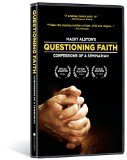| Reviews & Columns |
|
Reviews DVD TV on DVD Blu-ray 4K UHD International DVDs In Theaters Reviews by Studio Video Games Features Collector Series DVDs Easter Egg Database Interviews DVD Talk Radio Feature Articles Columns Anime Talk DVD Savant Horror DVDs The M.O.D. Squad Art House HD Talk Silent DVD
|
DVD Talk Forum |
|
|
| Resources |
|
DVD Price Search Customer Service #'s RCE Info Links |
|
Columns
|
|
|
Questioning Faith
- Dr. James Cone
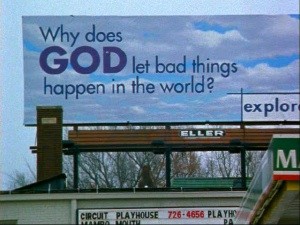
The Movie
Shortly after my mother died of cancer in 1984, my father mentioned he had a VHS tape of her talking about her struggle shortly before her passing. Our family was never one for video cameras, so this was the sole source of her image as a living, breathing human being, far more vivid than my memory or any photographs. It took me a long time to pop that tape in, and when I finally did I was met with a mix of powerful emotions--the indescribable joy and love of seeing and hearing my mother again, and the gut punch of knowing that she was gone.
There's a similar moment in Questioning Faith: Confessions of a Seminarian, the 2002 documentary from Macky Alston that was part of Cinemax's Reel Life series. Part of his purpose for making the film was to revisit the life of one of his friends--fellow seminarian Alan Smith, who died of AIDS shortly after starting his own ministry. Smith appears in happier times, singing and smiling with Alston while the two worked at a soup kitchen--and in an old VHS recording made as his health was declining. Alan speaks about his struggle as his partner and Alston watch, their joy and sadness providing one of the film's more powerful moments ("It makes him feel much more alive," notes Alan's lover).
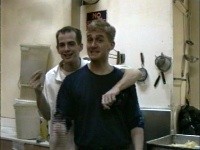
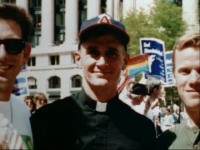
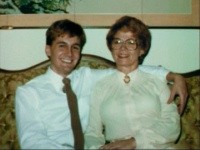
Smith's death was a moment that rattled Alston's beliefs, shaking the foundation of his religious core. How could he help others if he didn't have faith himself? Alston starts his own mission to uncover what happened to Smith's faith shortly before death--an answer he hopes will help him understand his own faith, and what he would believe in the face of tragedy. How does God operate? Is God all powerful? Vengeful? How can God allow such suffering to happen in the world?
To help find answers, Alston hits the road to talk to a variety of subjects about God and faith. Some of the people are from Smith's life--like his uncle, lover and mother, who provides one of the most heart-wrenching moments as she recalls the life of her son: "He believed there is a God up there, or a higher power that's watching over us. I think I have to believe that to get through the day."



Others subjects are strangers facing their own struggles. Alston talks to his boyfriend's grandmother, whose experience with loss helped shape her atheist views. She doesn't believe she'll ever see her husband again: "I think it's a strange thing to believe in...at what point would you see this person? At what age? Would it be when he was younger or old? It's not possible, and I wouldn't want it...that would be unnatural. I think when you're gone, you're gone...and that's it."
Next up is a Muslim chaplain filmed the night before brain surgery, as friends and family gather to show her their love (another one of the film's more moving moments): "This may be the last time I see all of these faces...I'm a realist," she says, later sharing the true joy of life: "To have your family in your life...what else is there? That's just the greatest gift of all." We also meet her daughter, who has a powerful vision during her mom's surgery and soon becomes pregnant with twins, providing another story for Alston to follow.
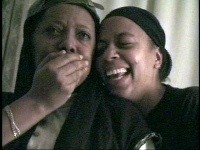


The filmmaker briefly talks with the doorman at his seminary, a Holocaust survivor who shares how he lost and found God (it's a short sequence, one that could use its own film). Up next is a 19-year-old Buddhist woman who lost her father at a young age: "I find him in everything that I see that is beautiful, everything that I feel, everything that I experience...and I love that about Buddhism, that he doesn't go somewhere, someplace, but that he is energy everywhere."
The final (and perhaps the most moving) story revolves around a seminary chaplain with cancer, a struggle she believes gives her a better understanding of struggle--and thus makes her better equipped to help others: "God is a trip sometimes...there is nothing like experience." We see her after her hysterectomy, when she shares more of her struggles and her progress (one of the most poignant parts of the film comes as she talks about the joy of regaining a basic bodily function).
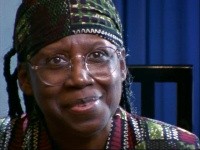
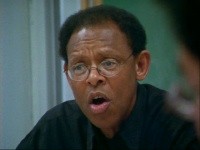
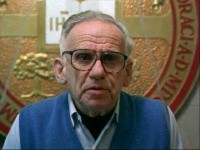
The film returns to focus on Smith at the end, when Alston explains that despite knowing about his friend's illness--and even frequent requests--he never visited him in the hospital during the last six months of his life. "Why wasn't I there for him? I was busy. I didn't think he would die that soon. But on a deeper level, I'm sure his illness represented my greatest fears, my own personal mortality." It sounds moving, but the admission of guilt doesn't have its intended impact. Questioning Faith is a powerful work when it focuses on the personal stories, struggles and beliefs of its subjects (be sure to watch through the closing credits). But when Alston tries to provide a connecting thread, he fails to create any true depth, meaning or impact. While his intentions are noble, Alston's film boils down to the age-old question: "Why do bad things happen to good people?" It's a question most of us ask as very young children, and Alston can't escape that mindset.

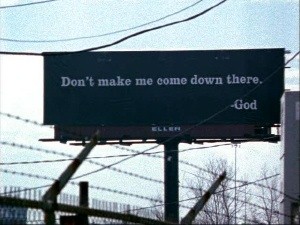
He frequently comes across as childlike in his musings ("If Lazarus was saved, then why not Alan?"; "I don't understand faith...it just seems more logical to not believe"; "Heaven and angels...I want to believe all that, but the ore I study the Bible, the more it puzzles me."). He's also comes close to patronizing his interview subjects, his interaction marked by insensitive (or sometimes just silly) questions and comments. It's almost like he's not truly listening or engaged, more concerned with getting sound bytes to his forced questions: "Why do you think God would take Alan's life?" he asks his friend's uncle, who answers how most of us would: "You can't question God."
But I was most annoyed with Alston's mildly juvenile interaction during two other segments, starting with an awkward exchange with a Tennessee reverend who says, "I believe in angels...guardian angels." To which Alston chimes in, "Dead people?!" Then there's this exchange with Muslim chaplain Jamilla Abdul-Rahman: "Don't you ever doubt?" he asks. "No," replies the calm, assured woman, to which Alston becomes an annoying 8-year-old: "No?!!" (I was also perturbed by his reaction to a terrible tragedy later, his cliché statement beginning "I don't understand why...").
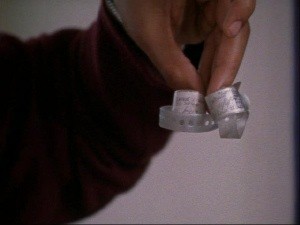
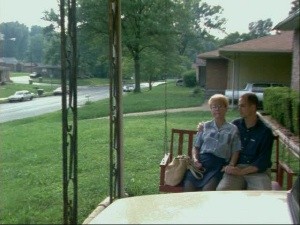
Despite his honest intentuions, the filmmaker isn't a very good narrator or journalist; his questions and statements lack substance, creating a hollow shell that can't provide any deep meaning to connect the meaningful stories. Alston is lost a lot, and his thoughts are presented without emotion--he's boring, mechanical and frequently frustrating. That quality doesn't help during his empty admission of guilt at the end: You hear his words, but you don't feel them. You don't get a true sense of his struggle or purpose, especially when compared to everyone else here. Alston also makes some odd artistic decisions, injecting archive footage from old black-and-white religious movie commercials, clips that come across awkward. (There's also some misplaced elevator music that serves counter-productive to the film's tone.)
Far more engaging is Dr. James Cone, a ministry professor who appears in a few scenes: "How can we develop a theology...that is credible in the face of 16 million dead? And it's still going on, that kind of catastrophe. Now the question is, what kind of theology is credible in the face of that? What kind of sermon are you going to preach?" he asks of his students, trying to find answers in an effort to comfort patients suffering from the AIDS virus. That's far more thought-provoking than Alston's musings ("Some people would say that Alan got what he deserved. But is that actually how God operates? Is the God I believe in--a good God--also a punishing God?").
It's an odd blend of thoughts and scenes that provide doses of compassion and inspiration. But ultimately, the film doesn't have the strength to rise above and provide any deeper sense of clarity or purpose. Good documentarians are usually the ones who open an impartial window to the world without any interruption or influence; in Questioning Faith, Alston does that most of the time, and he certainly means well. But he would have benefitted from a sharper focus--and more perspective, purpose and passion--with his own struggle.
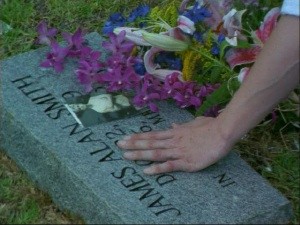
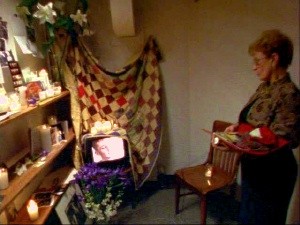
The DVD
Video:
Presented in full frame, the image here is what you'd expect from a low-budget documentary. The quality varies with the settings and cameras used, and the picture sometimes lacks sharpness. There's an overall dark quality, with grain popping up at times.
Audio:
The 2.0 audio is more than sufficient to relay all of the dialogue, which is always easily understood.
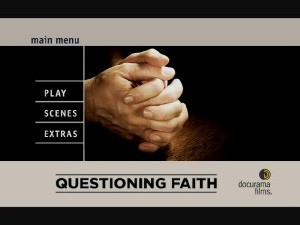
Extras:
The main extra here is a 42-minute interview with filmmaker Macky Alston, who comes across far more sincere and engaging here. Broken into 13 segments, this interview covers a wide range of topics--including the making of the film and the director's beliefs. One of the more interesting revelations comes early, when Alston reveals he was a filmmaker when he entered the seminary ("I like to play in the sandbox I was born in...I'm not a minister in the professional sense"). The seed to make the documentary was already planted when he began his studies, before his friend Alan died--a fact that may alter your perception of the work (he says the original title of the film was Alan Smith: Life After Death, and seems more personable when he offers this admission: "I screwed up with Alan").
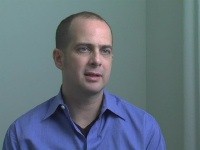 "The problem with playing in the sandbox that is religion is that it can come off corny pretty quickly," shares Alston, noting there aren't many films that chronicle the religious experience. "It's very hard to document it in a way that feels authentic to what's going on in the hearts or mind or spirit." He also touches on the film's added relevance after 9/11 (it was filmed shortly before the tragedy), providing the interview's most interesting observations (he points out one shot with Buddhist Ahtoy Wonpat-Borja in front of the World Trade Center). He also updates us on the film's subjects, and shares how his own beliefs have evolved. It's an interesting chat that enhances the documentary, and puts a more human face on the filmmaker, who comes across far more genuine and heartfelt here.
"The problem with playing in the sandbox that is religion is that it can come off corny pretty quickly," shares Alston, noting there aren't many films that chronicle the religious experience. "It's very hard to document it in a way that feels authentic to what's going on in the hearts or mind or spirit." He also touches on the film's added relevance after 9/11 (it was filmed shortly before the tragedy), providing the interview's most interesting observations (he points out one shot with Buddhist Ahtoy Wonpat-Borja in front of the World Trade Center). He also updates us on the film's subjects, and shares how his own beliefs have evolved. It's an interesting chat that enhances the documentary, and puts a more human face on the filmmaker, who comes across far more genuine and heartfelt here.
Also included is a text filmmaker bio and trailers for other Docurama releases.
Final Thoughts:
As a window into the lives of people with different religious beliefs struggling with adversity, Questioning Faith is frequently moving and powerful. But when filmmaker/narrator Macky Alston tries to connect them all with his own search for faith and God's motivations, the film fails to reach any meaningful conclusions. His quest to find out why bad things happen to good people is frequently marked by empty, unemotional and often childlike musings that pale in comparison to his subjects' stories. If you can forgive his indulgence, some thought-provoking material awaits. Rent It.

|
| Popular Reviews |
| Sponsored Links |
|
|
| Sponsored Links |
|
|
| Release List | Reviews | Shop | Newsletter | Forum | DVD Giveaways | Blu-Ray | Advertise |
|
Copyright 2024 DVDTalk.com All Rights Reserved. Legal Info, Privacy Policy, Terms of Use,
Manage Preferences,
Your Privacy Choices | |||||||









